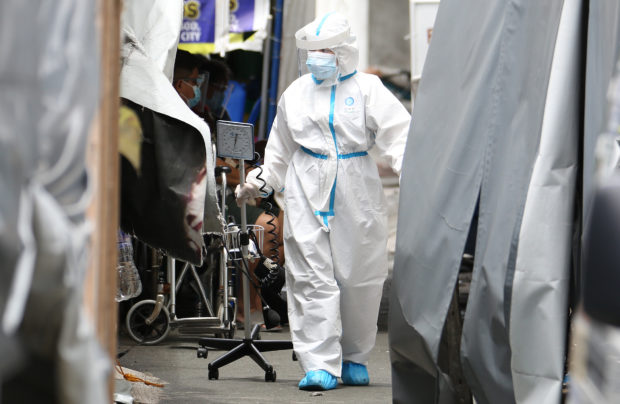
CARRYING ON A medical worker on duty at a hospital in Mandaluyong City on Sunday. Hailed as heroes amid the threat of the coronavirus pandemic, health workers have also endured discrimination in the streets and in their neighborhoods and poor labor conditions in some hospitals. —NIÑO JESUS ORBETA
MANILA, Philippines — The Department of Health (DOH) on Sunday reported another big jump in the number of recoveries from COVID-19, but also recorded thousands of additional infections, a day before the government was to decide whether to lift or keep in place general community quarantine rules in Metro Manila and four surrounding provinces.
Following its new strategy of counting recoveries—that is, counting mild and asymptomatic patients as recovered after 14 days of isolation—the DOH reported 22,319 recoveries, bringing the total number of COVID-19 survivors to 157,403.
More infections
It was the DOH’s fifth mass-recovery report since July 13, when it first applied the new strategy and announced 4,325 recoveries.
Sunday’s report, however, included 4,284 additional coronavirus infections, raising the national total to 217,396 cases.
The DOH said 102 more patients died, pushing the death toll to 3,520, which, considered with the recoveries, left the country with 56,473 active cases, 91.3 percent of which were mild, 6.1 percent asymptomatic, 1.1 percent severe, and 1.6 percent critical.
Of the additional cases, submitted by 100 of 110 accredited laboratories, 2,207 came from Metro Manila, 327 from Laguna, 191 from Cavite, 161 from Batangas, and 147 from Rizal.
On the recommendation of local officials, President Rodrigo Duterte placed Metro Manila and the four surrounding provinces under general community quarantine two weeks ago, rejecting a recommendation of the medical community to place the region under strict lockdown to bring the transmission of the new coronavirus that causes COVID-19 to manageable levels.
The President rejected another blanket lockdown to allow a wider reopening of the economy, which slipped into recession in the second quarter after the gross domestic product dropped by 16.5 percent, the country’s lowest since 1981.
Duterte is expected to announce on Monday new quarantine levels after a meeting with the Inter-Agency Task Force for the Management of Emerging Infectious Diseases, the temporary government body that oversees his administration’s coronavirus response.
Targeted lockdowns
The task force has shifted strategies from blanket quarantine to targeted lockdown — shutting down the exact location of outbreaks, such as neighborhoods and streets, instead of the entire village — to spare clear communities and allow people to go to work.
Despite thousands of daily additional infections, the DOH claims the two-week lockdown of the metropolis and the nearby provinces has eased the pressure on the health system.
On Sunday, it reported that as of Saturday, about 49 percent of intensive-care beds for COVID-19 patients nationwide had been occupied, while 29 percent of mechanical ventilators had been in use.
On Saturday, the DOH called on the public to respect the privacy of patients, following reports that lists of people ailing from the coronavirus disease were appearing on social media.
The DOH released a statement reminding the public that disclosing patient information is illegal and could stigmatize patients.
Tell only health authorities
It said that while officials are required by law to report infectious diseases, the same law requires them to ensure patient privacy and confidentiality of information entrusted to them.
The DOH said patient information should be shared only with public health authorities, who are knowledgeable in data privacy.
It also asked other agencies and local governments to help ensure the protection of the privacy of COVID-19 patients and their families.
“[As] part of their mandate to comply with the DOH COVID-19 guidelines on data privacy and protection, they are responsible for protecting and preserving the identities of COVID-19 cases and identified close contacts, and their families so that this does not result in undue discrimination or physical and emotional harm or stress,” the DOH said.
—Tina G. Santos